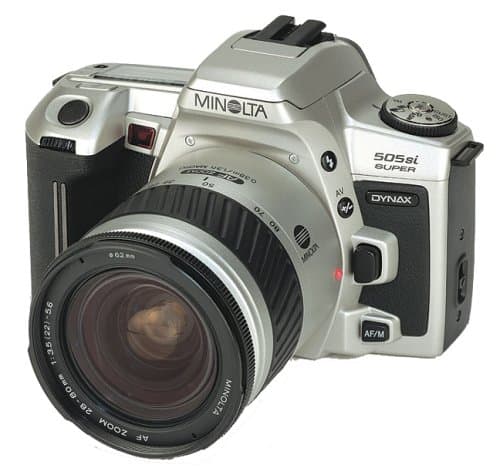
Minolta Dynax 500si Super
Ease of Use
Features
Photograph Quality
Minolta Dynax 500si Super
When you purchase through links on our site, we may earn an affiliate commission. Here's how it works.

User Reviews
Photograph Quality
Features
Ease of Use
Value For Money
Not Very Good Picture Quality..
not very good picture quality..
I found this review not helpful because...no info
Photograph Quality
Features
Ease of Use
Value For Money
The Minolta Dynax 500si Super Has A Great Performi
The Minolta Dynax 500si Super has a great performing lite body can't nock it
Photograph Quality
Features
Ease of Use
Value For Money
I Have A Problem With My Dynax 500si Camera, I Can
I have a problem with my dynax 500si camera, I can't open it, when I put the battery in then it says "help"that is all , so if anyone can tell what's problem and how to fix it then it will be great..thanks
Me too, i look forward to the reviews guide
, thats wat happened to mine :( its not working !
Photograph Quality
Features
Ease of Use
Value For Money
I've Had My Minolta Dynax 500si For More Than 15 Y
I've had my Minolta Dynax 500si for more than 15 years and I have never had any problems. Every photo comes out perfectly and I mostly use the automatic setting. I think I've changed the battery about 4 times max in all these years. I also have a 300m zoom lens which is really fantastic and has only enhanced the quality of photos I have been able to take.
My only dilemma now is that the lens has a very fine 'spider-vein' effect developing along the edges and I'm not sure where to take it.
Photograph Quality
Features
Ease of Use
Value For Money
Zoom Is Good Focus Is Good Best Non Digital Camera
Zoom is good focus is good best non digital camera I have ever brought
Brought on ebay great camera good focus and vary easy to use I would totally recommend it as a first slr camera.
Photograph Quality
Features
Ease of Use
Value For Money
I Think Its A Matter Of Going To A Good Dealer To
I think its a matter of going to a good dealer to buy it and also having to keep it properly. Mine, i bought it from a good dealer, and i bought it in Singapore and that because it's the old SLR cameras. That's why i kept it in mint condition, although i used it now and then.
Features
Focus In On Picture, Always Dark? Changed Lens, St
Focus in on picture, always dark? Changed lens, still dark. Cant see object to shoot picture ? dave444316
Photograph Quality
Features
Ease of Use
Value For Money
- Has A Resonable Number Of Settings To Play And F
- Has a resonable number of settings to play and fool around with- makes excellent pictures...- Long battery life which I love most- together with the 3500 minolta flash it makes excellent indoor pictures
Photograph Quality
Features
Ease of Use
Unreliable Electronics That Keep Breaking Down. Af
Unreliable electronics that keep breaking down. After 3 breakdowns at times when crucial shots were missed this camera met an old friend from my toolbox. Yes you guessed it, my biggest hammer. That was my most satisfying moment of owning this camera. I really miss my X700!
Photograph Quality
Features
Ease of Use
Value For Money
Excellent In Manual Setting, Ideal For Black & Whi
Excellent in manual setting, ideal for black & white ilford films.
Compact and strong body. I recommend the Minolta Dynax 500si super camera to everyone.
Q&A
There are no questions yet. Be the first to ask a question.